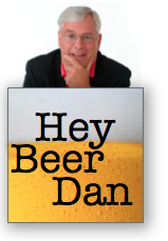At first we thought he might be splitting hairs, but as we considered his suggestion, we began to see his point. And then we looked at three craft beer ads with his idea in mind, and we uncovered a nascent advertising dilemma in the craft-beer world that proved him right. Hands down.
Three craft beers chasing the same strategy
Imagine you're one of the craft brewers who's just become successful enough to invest in TV ads. (There aren't that many now, but there will be.) You need an ad strategy, right? So, here's one you think captures what makes you special:
Our craft beer brand is all about..."real people"/from a nice place/believing in their beer/having fun brewing beers/using good wholesome ingredients/(while caring for the planet)
It's the strategy craft brewer Fat Tire chose...
If these craft brewers--and many who will no doubt follow them into television advertising--land on essentially the same strategy, that strategy loses power. What could well have been distinctive and differentiating for the single pioneering brand--in this case, Sam Adams--is substantially eroded when it's divided among several brewers. The audience will soon have a difficult time separating one brand from the other. And that risks all these brands appearing to be more similar, rather than more distinctive. It's the opposite of differentiation.
A generic sale
There's a term for this all-too-common advertising error. It's called a "generic sale." The mistake is creating advertising that sells a category of products, but fails to differentiate the particular brand. So the advertiser's money sells everybody's brand, including his own. But not exclusively his own. It's like one brewer buying hops, and then giving some away to their competitors.
The only time a generic sale makes good sense is when the brand doing the advertising has such a commanding market-share advantage, that most of the business resulting from the generic, category-selling ads will accrue to it anyway. Budweiser long enjoyed such a position of dominance in the beer business. So campaigns like "This Bud's for You" and "When you say Budweiser, you've said it all" could devote all their energy to "fun times with beer" or "hard-working guys need a cold beer at day's end" sorts of generic beer-selling. If all it accomplished was to prompt Joe to go out and buy a six-pack, most of those six-packs would have "Budweiser" written on them.
Differentiate or else
Brands in crowded, competitive markets can ill-afford spending on ads that fail to make them stand out. That's why we're improving or "Job#1" evaluation of advertising, and revising our second question to: "Does the ad differentiate this brand?"
However unintentional, if your advertising makes you blend in, you're spending some of your money on behalf of your competitors. But when your ads differentiate and you stand out from the pack, you take business... from the pack.

 RSS Feed
RSS Feed
